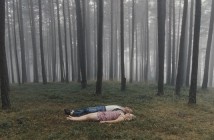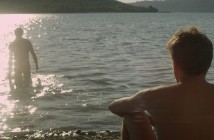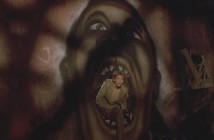Though it’s occupied DVD and Blu-Ray shelves for some time now, the release of Drive on demand this week is a sure sign of the escalating influence the distribution means is beginning to accrue with bigger, more popular titles. The remainder of the week’s releases play second fiddle—let’s be honest, most things do—but still manage to offer a good deal that’s worth the investment of your time. Independent films from both sides of the Atlantic, an older sequel to an all-time great, and a pair of foreign imports tapping into timely issues: whatever takes your fancy, there’s sure to be something here to suit your tastes.
Watch it here
Considering the foolhardiness of even attempting a sequel to one of the greatest films ever made, one has to admire the aspirations of writer/director/producer Peter Hyams for daring to follow in Kubrick’s footsteps in the first place. His take on the mysterious monoliths naturally pales in comparison with the astounding masterpiece that was 2001, but there’s a lot to be admired about 2010: The Year We Make Contact, not least of all an impressive cast. Bob Balaban stands out as the engineer tasked with reviving HAL-9000, his share of the story doing the most to build upon the pre-existing mythology in a satisfactory way. The return of Dave Bowman facilitates some nicely creepy moments that do well to emulate the atmospheric intrigue of the original. Even with a dissatisfying ending that takes away a tad from the magic of the mystery Kubrick gave us, 2010 is a respectable sequel that dares to walk in the shadow of a cinematic giant. RECOMMENDED.
Watch it here
With the astounding popularity of the superhero subgenre in the last decade, it’s little surprise to see independent filmmakers attempting to elbow their way in toward a share of the success. Kick Ass and Super are the obvious examples, and both function undeniably as comparison points for Michael Morrissey’s Boy Wonder. Its protagonist, a late teenage boy whose mother’s murder nine years prior inspires him to dish out street justice, never dons a fancy costume, but the tropes of the genre are clear to see. It’s in the murky moral dilemmas the film raises that it finds its finest successes, even if many of these are stifled by one too many familiar plot points, not least of all the rather poorly acted role of the newly promoted detective. Plot twists aplenty add an edge of mystery that saves the day though, and Boy Wonder concludes with a wonderfully wise indulgence in the darker themes it’s flirted with throughout. RECOMMENDED.
Watch it here
Biographical documentaries are never an easy sell, striving essentially to convince the viewer that he or she is less important than the film’s subject. After all, why should we dedicate 90 or so minutes of our life to learning about somebody no more interesting than ourselves? That question occupies the mind for the entirety of Dragonslayer, its subject slacker skateboarder Josh “Skreech” Sandoval. Why exactly should we invest our valuable time in the story of this man? Director Tristan Patterson appears to find him a valuable epitome of modern day America in all his aimless wandering through life, a viewpoint he struggles to effectively sell. Scenes of casual drug usage and falling off skateboards do little to add weight to the sequences where Sandoval espouses his political and philosophical ideologies, which frequently sound like the musings of someone only vaguely familiar with the concepts of politics and philosophy. How anyone could think him a compelling figure is a mystery. AVOID IT.
Watch it here
As much the stylish lovechild of No Country for Old Men and Taxi Driver as a neon-infused meshing of classical Hollywood noir with the colourful compositions of its Cannes-anointed director, Drive’s wowing aesthetic made it cool to be an art film. Its visual resplendence is but one of its many facets though, the underlying emotion of a perfectly simple story what really worked to make this such a standout film. With the unshakeable support of a gloriously pathetic Cranston and fan favourite Brooks, Refn and his primary players craft an unlikely romance of subtlety so smooth it’s easy to miss. From the attention demanding opening to the already iconic elevator scene, the story offers as much in the way of action excitement as it does in character depth, Refn’s touch as virtuosic with the extravagant set pieces as in the quiet, compassionate moments where less is most certainly more. Gosling is breathtakingly stoic as a real human being, and a real hero. HIGHLY RECOMMENDED.
Watch it here
Office Space from the perspective of Milton, but with higher dramatic aspirations. That could well be the pitch for Frank Cappello’s He Was a Quiet Man, recounting the events that befall a dissatisfied worker after he shoots a crazed gunman with the weapon he intended to use for much the same purposes. There’s potential aplenty in the story, but Cappello never finds a way to really mine the idea for anything other than stupid humour and a childish view of the world. To attempt big CGI set pieces—our protagonist fantasises about his workplace exploding—on a meagre independent budget is an admirable pursuit, but no amount of goodwill can overlook the agonising cheapness of the graphics here offered. Indulging in the kind of nauseatingly quirky humour that sees a talking pet fish as oh so funny, Cappello’s script is an unmitigated mess with a lazy ending that only serves to summate the film’s overall pointlessness. AVOID IT.
Watch it here
A film not half as impressive as its powerhouse central performance, London River struggles to contain the intense brilliance of Brenda Blethyn, its pastiche view of a London just after the 2005 bombings never real enough to do the actress’ hard work justice. She plays the concerned mother of a student she cannot contact in the wake of the terrorist attack, prompting her to journey forth to the capital in search of her daughter. A black Frenchman who finds himself in much the same circumstance opens the film up to an exploration of racial attitudes in a post-9/11 world, but it’s all handled with such clean convenience as to rob it of any potential meaningful effect. Reasonably well shot, and thriving on the strength of its leads, it’s not a bad film, it just hasn’t a strong enough script to make it as culturally incisive as it ought to have been. WORTH WATCHING.
Watch it here
As if we mightn’t already have guessed, it seems fair to assume from watching London Boulevard that the successes of The Departed can be attributed to the input of Scorsese. William Monahan, whose Departed screenplay bagged him an Oscar, makes his directorial debut here, displaying little of the character depth that elevated Scorsese’s film above the simple thriller machinations of its plot. Colin Farrell adopts a pitiful English accent as a newly released convict hired as security for a reclusive actress played by Keira Knightley. Even as a character he’s done a thousand times before, Ray Winstone is the highlight, the delirious fury with which he spits out vicious words always a treat to behold. David Thewlis too stands out as a strange cohort of Knightley’s character with a penchant for Derek & Clive that at least livens up the background noise. A plot with absolutely nothing new does little of note with its few valuable elements, making this a dull but inoffensive genre exercise. SO-SO.
Watch it here
Part dark crime movie, part fantastical treatise on the cult of celebrity, Ken Loach’s Eric Cantona-starring film sees lost-in-life postman Eric Bishop struggle to deal with raising two teenage boys amid his own dissatisfaction in a life lacking the love he unwisely left many years ago. With the wonderful working class wit so frequent a staple of Loach’s work, Looking for Eric thrives on a strong spine of humour which gives the film room aplenty to slowly build a fine darkness. Cantona has an excellent time playing on his own infamous eccentricities as a projection of the other Eric’s marijuana-addled mind, Paul Laverty’s screenplay stuffed with oddball philosophising that perfectly suits the relationship between the dual namesakes. Steve Evets expertly explores the darker corners of his character, his distinctly everyman manner adding a refreshing genuineness to a somewhat unremarkable love story. With a hilariously strange conclusion it cements itself as one of the most original and fun sports movies of the last few years. RECOMMENDED.
Watch it here
With Schleinzer having acted as casting director for a number of Haneke’s films, it’s little surprise that his own directorial debut has been considered in context of the Austrian auteur’s cold view of the world and human cruelty. While Schleinzer does bear aesthetic similarities to Haneke, his handling of difficult ideas is never half as accomplished. The focus on a child molester as protagonist sets up an interesting rumination on the nature of evil: his actions with his child captive are among the most abominable and heinous there are, yet even so we can’t help but feel some desire to better understand him. It’s here that the film fails, never managing to give us that understanding, to present us with that greater deal of appreciation. Invoking fascinating questions without ever coming close to formulating answers, Michael is a film less interesting than it may seem, though its visual prowess does mark its director as one to watch. RECOMMENDED.
Watch it here
A heavy-handed analogy of class relations post-financial collapse, My Piece of the Pie begins with the attempted suicide of its heroine, who just recently lost her ability to support her family when the factory she worked at was shut down. The drastic circumstances under which we first meet her seem hugely at odds with her later cheeriness, a scene where she dances around a shopping centre to the tune of “Pretty Woman” hardly what one would expect from someone who had just a few weeks before attempted to take their own life. Its lax character continuity notwithstanding, and the final third offers an even bigger offender, the film does open the door to some interesting questions on the morality of money markets and those who trade in stocks without ever taking heed of the lives and livelihoods that hang in the balance. It’s certainly no great work of social analysis, but it is smart and sharp enough to overcome its obvious problems. WORTH WATCHING.





Pingback: https://www.youtube.com/watch?v=kFAyImX-PQA()
Pingback: yspro.ne.jp()
Pingback: Daine Basha()
Pingback: click here for more()
Pingback: moved here()
Pingback: paintless dent repair training()
Pingback: movie2k()
Pingback: ramalan bintang()
Pingback: league of legends tee shirts()
Pingback: Brand Bangla Eshop()
Pingback: PREMIUM PROMOTIONS ON EXCLUSIVE CLUB CASINO()
Pingback: seo consultant minneapolis()
Pingback: how much do mobile porn developers make()
Pingback: sensi pearl app()
Pingback: this website()
Pingback: poker()
Pingback: sacred 3 trainer()
Pingback: town hall 8 war base for clan wars()
Pingback: meaning of names()
Pingback: fifthavenue()
Pingback: movietube()
Pingback: stlpiky()
Pingback: Terri()
Pingback: Stacy Nesti()
Pingback: movietube()
Pingback: my singing monster cheats()
Pingback: hungry shark evolution hacked apk()
Pingback: Simple Drawing()
Pingback: guitar picks()
Pingback: antispam e.v.()
Pingback: second hand clothes wholesale()
Pingback: water dispenser 5 gallon glass()
Pingback: publisher()
Pingback: Candace()
Pingback: dog walker in naples()
Pingback: naples dog walkers()
Pingback: your online needs()
Pingback: take home pay calculator()
Pingback: consignment shops quincy il()
Pingback: stop and drop()
Pingback: real traffic()
Pingback: coaching()
Pingback: Travel guide blog()
Pingback: sticky notes 8()
Pingback: dart boards for the office()
Pingback: bathroom scale at walgreens()
Pingback: tv antenna 80 mile range()
Pingback: hcg injections()
Pingback: Cash 4 Clothes()
Pingback: xnxx()
Pingback: IATA Dog Kennel in Sri Lanka()
Pingback: punta cana excursiones()
Pingback: tenerife estate agents()
Pingback: العاب بنات()
Pingback: addicted to rehab()
Pingback: tenerife forum()
Pingback: Castellana()
Pingback: Celine()
Pingback: rosengard.tv()
Pingback: roasting pan vs cookie sheet()
Pingback: overnight cat care naples()
Pingback: party light tea lights()
Pingback: help loading budget rental truck()
Pingback: best mattresses 2016()
Pingback: get free xbox live codes in 60 seconds()
Pingback: cat care naples()
Pingback: nola.com LA Robert Creely Attorney()
Pingback: mobile strike hack apk()
Pingback: what you need to know()
Pingback: howrse hack()
Pingback: ingreso extra()
Pingback: party lights for party()
Pingback: dog care naples florida()
Pingback: keepyourhair.cba.pl()
Pingback: tech startups()
Pingback: porno()
Pingback: porno()
Pingback: porno()
Pingback: visit the up coming article()
Pingback: Crop circle()
Pingback: Margherita()
Pingback: Sexcontact()
Pingback: spiritual mentor()
Pingback: no deposit casino�()
Pingback: clash royale builder()
Pingback: check this out()
Pingback: clash royale tricks()
Pingback: porno()
Pingback: Obsession Phrases()
Pingback: legacyfoodstorage web source()
Pingback: YouTube()
Pingback: o nas - klimczak hair designers()
Pingback: android game cheat apk()
Pingback: foro escorts()
Pingback: Off Grid Pure Sine Wave Wind Inverter()
Pingback: alopecia areata()
Pingback: theporndude()
Pingback: high google page ranking()
Pingback: NBA Online Stream()
Pingback: erotic4u.hotcamso.pw()
Pingback: black hat social bots()
Pingback: brazzers porn videos()
Pingback: easiest ways to make money()
Pingback: nordstrom coupon()
Pingback: hack para clash of clans()
Pingback: clash of clans hack()
Pingback: jumping castles for sale()
Pingback: neo2 scam()
Pingback: samsung galaxy note5 Review()
Pingback: Affiliate Trax Review and Bonuses()
Pingback: vinyl windows()